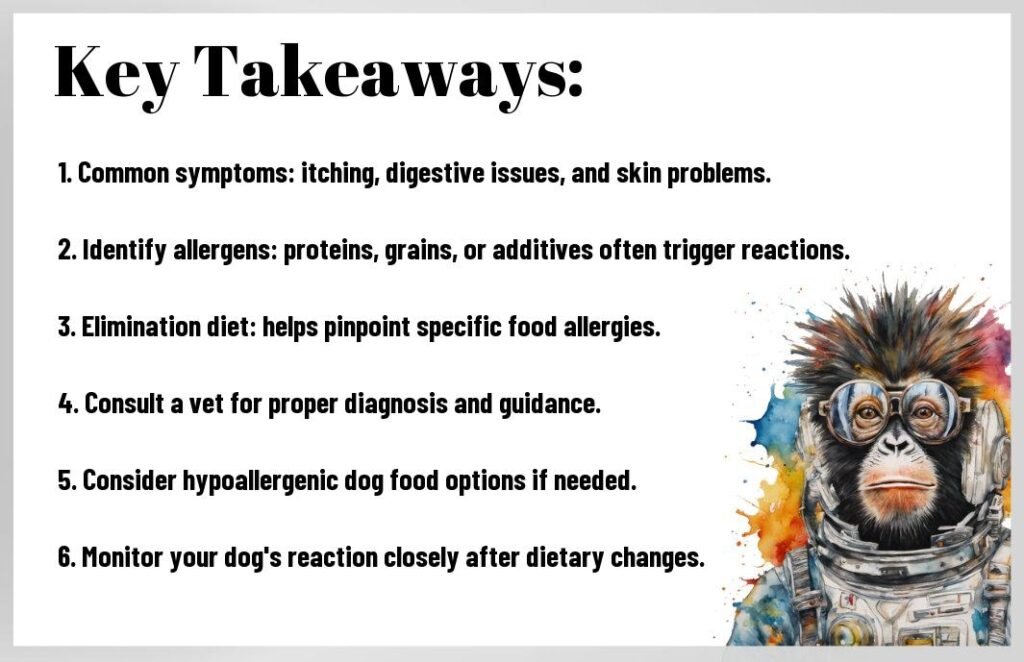Natural Remedies For Dog Food Allergies – A Holistic Approach

Remedies for dog food allergies can provide you with effective, gentle alternatives to conventional treatments. If your furry friend is suffering from allergic reactions to certain food ingredients, embracing a holistic approach may help you alleviate their symptoms while supporting overall health. In this blog post, you will discover natural solutions, dietary adjustments, and preventative measures that can strengthen your dog’s immune system and improve their quality of life. It’s time to empower yourself with knowledge and take the first steps towards healing your beloved pet.
Key Takeaways:
- Identify Allergens: Understanding the specific ingredients that trigger allergic reactions in your dog is necessary for effective management.
- Holistic Diet: Implementing a natural, balanced diet that avoids common allergens can significantly improve your dog’s health.
- Supplements: Incorporating omega fatty acids, probiotics, and natural antihistamines can support your dog’s immune system and reduce allergy symptoms.
- Natural Remedies: Home remedies such as oatmeal baths and coconut oil can soothe skin irritations and provide relief.
- Consult a Professional: Collaborating with a veterinarian or a holistic pet care specialist can help tailor a treatment plan that is safe and effective for your dog’s specific needs.

Understanding Dog Food Allergies
While navigating the world of pet care, understanding dog food allergies can significantly enhance your dog’s quality of life. Dog Food allergies often lead to discomfort and various health issues when they consume certain ingredients, prompting pet owners to seek suitable remedies and treatments. The holistic approach to managing these allergies involves identifying triggers, employing natural remedies, and ensuring your dog’s dietary needs are met without compromising their health.
Definition and Symptoms
Definition: Dog food allergies occur when your dog’s immune system mistakenly identifies a normally harmless food protein as a threat, leading to an abnormal immune response. This reaction often develops over time, meaning that your dog might not show signs of allergies until they have been consuming the offending ingredient for an extended period. Common signs of dog food allergies can include itching, gastrointestinal upset, and skin infections, all of which can disrupt your dog’s daily life and happiness.
Symptoms can manifest in various ways, making it imperative for you to pay close attention to your dog’s behavior and physical condition. They might scratch excessively, develop hot spots, or suffer from chronic ear infections. Gastrointestinal symptoms, such as vomiting or diarrhea, can also be prevalent in dogs with food allergies, so observing and documenting any recurring issues can be vital in identifying the underlying causes.
Common Food Allergens
One of the key aspects in managing dog food allergies is recognizing the common food allergens that often trigger reactions. Proteins, such as beef, chicken, lamb, and fish, tend to be among the most frequent culprits. Grains, particularly wheat and soy, as well as dairy products, can also elicit allergic responses in some dogs. Your dog’s unique body chemistry means that allergens can vary widely from one individual to another, so it’s crucial to monitor your pet’s reactions to different foods.
Diagnosis and Testing
Understanding the diagnosis and testing process for dog food allergies is crucial in helping your furry friend find relief. Typically, the first step involves a thorough examination by a veterinarian, who may ask detailed questions about your dog’s diet, symptoms, and medical history. This information allows them to assess the potential for a dog food allergies. In some cases, the vet may recommend an elimination diet, which involves removing suspected allergens from your dog’s diet for a specific period to monitor changes in their health.

Holistic Approach to Addressing Allergies
Any pet owner knows that managing dog food allergies can be a daunting task. However, adopting a holistic approach provides a comprehensive strategy that looks beyond mere symptom relief. Instead of just addressing the immediate reactions, you’ll explore into understanding the root causes of your dog’s allergies, while also considering the overall well-being of your furry friend. This methodology ensures that you are not just treating allergies but also enhancing your dog’s quality of life and reinforcing their health from the inside out.
Importance of a Holistic Perspective
One of the chief benefits of a holistic perspective is its focus on the interconnectedness of bodily systems. When you consider your dog’s diet, lifestyle, environment, and emotional health, you can create a well-rounded plan that addresses allergies on multiple fronts. This means that you won’t just be looking at what your dog is eating, but also how stressors in their environment or imbalances in their nutritional intake may be contributing to allergic reactions. By taking all these factors into account, you’ll be steering clear of a one-size-fits-all remedy, tailoring your approach to the unique needs of your dog.
Nutritional Balance and Diet Modification
Addressing your dog food allergies begins with ensuring nutritional balance and modifying their diet appropriately. You may find that certain ingredients trigger allergic reactions, necessitating a shift to hypoallergenic or specialized diets that are better suited to your dog’s unique digestive needs. Such modifications can lead to significant improvements in your dog’s overall health by eliminating harmful additives and focusing on wholesome ingredients that support their immune system.
Incorporating Whole Foods
Nutritional balance is often achieved through whole food incorporation in your dog’s diet. Whole foods—such as lean meats, vegetables, and grains—offer natural nutrition without the chemical additives often found in processed dog foods. By opting for fresh ingredients, you can better monitor what your dog is consuming, thereby reducing the likelihood of unexpected allergic reactions while promoting overall health and well-being.
Natural Remedies for Allergies
To effectively manage your dog food allergies, you can explore various natural remedies that address the symptoms and support your pet’s overall health. These holistic approaches not only help alleviate immediate discomfort but also contribute to a stronger immune system, reducing the likelihood of future allergic reactions. It’s important to first identify the allergens affecting your dog, which will help you determine the best natural treatments suited for their specific needs.
Herbal Solutions
With an array of herbs available, you can incorporate several natural remedies into your dog’s diet. Herbs such as chamomile and nettles are known for their anti-inflammatory properties, helping to soothe irritated skin and digestive issues associated with allergies. Additionally, calendula has antibacterial and antifungal qualities that can promote faster healing of any skin irritations.
Essential Oils for Skin Relief
For many pet owners, important oils represent an exciting avenue to address their dog’s allergy symptoms. Certain important oils, like lavender and chamomile, possess therapeutic properties that can help soothe your dog’s itchy skin and reduce inflammation. By diluting these oils and applying them topically or diffusing them in the environment, you create a calming atmosphere that can provide relief from allergy-induced discomfort.
Probiotics and Their Benefits
Herbal and naturopathic practitioners often advocate for the inclusion of probiotics in your dog’s diet. These beneficial bacteria play a vital role in gut health by balancing the intestinal flora, which can greatly benefit your dog’s immune system. By fostering a healthy digestive environment, probiotics can help reduce inflammation and alleviate allergy symptoms, both of which are important to keeping your dog comfortable.

Homemade Diets for Allergic Dogs
Your pet deserves a wholesome diet, especially if they suffer from dog food allergies. A homemade diet can be a transformative solution, allowing you to control exactly what goes into their meals. If you’re curious about natural remedies to help your furry friend with allergies, consider exploring additional options like those found in this article on Dog Has Allergies? Try These Natural Remedies for Long- ….
Developing a Balanced Home-Cooked Diet
Diet plays an important role in managing your dog food allergies. When preparing a homemade diet, it’s vital to ensure that it is balanced and meets your dog’s nutritional needs. Consult with your veterinarian or a canine nutritionist to create a tailored diet that avoids allergens while supplying the necessary nutrients. Incorporate high-quality meats, grains, and vegetables to form a solid nutritional foundation.
Start the transition gradually. Begin by introducing small portions of the home-cooked diet while slowly reducing their previous food. Monitor your dog’s response to the new food closely to ensure there are no adverse reactions. Consistency is key in managing allergies and determining which ingredients your dog can tolerate.
Sample Recipes for Allergic Dogs
Dogs often thrive on simple and fresh ingredients that are easy to digest. A few sample recipes you could consider include boiled chicken with sweet potatoes and green beans or beef stew using carrots and peas. Tailor these recipes to your dog’s specific allergies, avoiding any harmful ingredients that could trigger a reaction.
With a little creativity, you can whip up nutritious meals that cater to your dog’s needs while providing variety to keep them interested. A mixture of protein sources, vegetables, and healthy fats will not only aid in allergy management but also promote overall health. Always ensure the meals are balanced, and when in doubt, do seek professional advice.
Nutrient Considerations
Any homemade diet you create needs to be carefully thought out in terms of important nutrients. It’s easy to overlook important vitamins and minerals when you’re cooking at home, so be sure to research which nutrients are critical for your dog’s health. Keep an eye on protein sources, as they play a pivotal role in maintaining muscle mass and supporting a healthy immune system.
To give your dog the best chance at thriving on a homemade diet, consider using a supplement specifically designed for dogs. Consultation with your vet can help you identify which nutrients are lacking in your dog’s current diet and adjust accordingly. This ensures that even while avoiding allergens, your furry friend gets all the necessary support for a vibrant and healthy life.
Lifestyle Adjustments to Reduce Allergies
Despite the challenges that dog food allergies can bring, making thoughtful lifestyle adjustments can significantly alleviate symptoms and enhance your dog’s overall well-being. By focusing on reducing environmental allergens, implementing proper grooming techniques, and managing stress, you can create a healthier and more comfortable atmosphere for your pup.
Reducing Environmental Allergens
Allergies can be triggered by various environmental factors, including dust mites, pollen, and mold. To minimize exposure to these allergens, you can start by keeping your home clean and free of debris. Regular vacuuming with a HEPA filter and washing your dog’s bedding frequently will help eliminate allergens that may accumulate. Additionally, consider using air purifiers with HEPA filters to maintain clean air quality indoors, especially during allergy seasons.
Proper Grooming Techniques
An effective grooming routine can play a crucial role in managing your dog’s allergies. Regular brushing helps remove allergens from your dog’s fur and skin, reducing the likelihood of allergic reactions. You should aim to brush your dog at least once a week, or more frequently for breeds with longer coats. Additionally, regular baths with hypoallergenic shampoo can help keep your dog’s skin healthy and free from irritants.
Techniques such as using a de-shedding brush or a grooming glove can be particularly beneficial for minimizing allergens. Ensure that you are also checking your dog’s ears and paws during grooming sessions, as these areas can accumulate allergens, leading to discomfort or irritation. By incorporating these grooming techniques into your routine, you can significantly reduce the presence of allergens and promote a healthier coat for your dog.
Stress Management Strategies
Techniques for managing stress are vital in lowering the impact of allergies. Chronic stress can exacerbate allergy symptoms in dogs, so it’s crucial to create a calm and soothing environment. Regular physical exercise, mental stimulation, and consistent routines can help your dog cope with anxiety, which may mitigate allergic reactions. You should also provide a safe and comfortable space where your dog can retreat during stressful situations.

Ongoing Monitoring and Adjustment
After establishing a natural remedy plan for your dog food allergies, it’s crucial to remain vigilant about their dietary and health needs. Ongoing monitoring and adjustment are key to ensuring your furry friend remains comfortable and happy. This process entails not only observing their reactions to specific foods but also making necessary changes to your approach as their health evolves.
Keeping a Food Diary
Ongoing documentation is vital; keeping a food diary can be one of the most effective tools in monitoring your dog’s progress. By recording their meals, treats, and any symptoms that arise, you can gain a clearer picture of which ingredients may be contributing to allergic reactions. This documentation allows you to observe patterns over time, making it easier to identify any problematic foods and eliminating them from your dog’s diet.
Regular Check-Ups with a Veterinarian
Adjustment of your remedy plan should ideally involve regular check-ups with your veterinarian. These appointments serve as a vital checkpoint to assess your dog’s overall health, manage allergy symptoms, and refine your natural remedies. A veterinarian will be able to conduct tests, and analyze your dog’s health more comprehensively, ensuring no underlying conditions exacerbate the allergies.
Adjusting Remedies Based on Response
Ongoing assessment of your pet’s response to natural remedies is necessary for effective management of dog food allergies. Pay close attention to any changes in symptoms after introducing new ingredients or treatments. If your dog shows improvements, it’s a sign that the adjustments are working; conversely, if symptoms persist or worsen, it may be time to consider alternative options.
Regular evaluation allows you to pivot promptly, ensuring that your dog is receiving the most beneficial care. This ongoing dialogue between you and your dog’s treatment plan can significantly enhance their quality of life and reduce allergic reactions over time.
Conclusion
Following this holistic approach to managing your dog food allergies can significantly improve their well-being and overall health. By integrating natural remedies, such as herbal supplements, dietary changes, and lifestyle adjustments, you can create a more supportive environment for your pet. It’s crucial to pay close attention to your dog’s specific needs, as every dog is unique. Collaboration with your veterinarian is crucial to ensure that any changes made align with your dog’s health requirements and do not interfere with existing treatments.
FAQ
Q: What are the common signs of dog food allergies?
A: Common signs of dog food allergies include excessive scratching, licking or chewing at their skin, ear infections, gastrointestinal issues like diarrhea or vomiting, and watery eyes. Symptoms can vary from mild to severe, and if you suspect your pet has a dog food allergies, it’s important to consult a veterinarian for proper diagnosis.
Q: How can I identify what ingredient my dog is allergic to?
A: Identifying allergens in your dog’s diet often involves an elimination diet. This means feeding your dog a limited ingredient diet with novel proteins and carbohydrates they have not previously consumed. Gradually, you can reintroduce one ingredient at a time to monitor for adverse reactions. It’s best to do this under the guidance of a veterinarian to ensure proper nutrition and health during the process.
Q: What natural remedies can help alleviate symptoms of food allergies in dogs?
A: Natural remedies for alleviating symptoms of food allergies may include adding omega-3 fatty acids to your dog’s diet, using probiotics to support gut health, and incorporating specific herbal supplements, like slippery elm or marshmallow root, which can soothe the digestive tract. Always discuss these options with a professional before trying them to ensure they’re safe and appropriate for your dog’s specific situation.
Q: Is it safe to make homemade dog food with dog food allergies?
A: Yes, making homemade dog food can be a safe and effective option for dogs with food allergies, as it allows you to control the ingredients used. However, it is important to consult a veterinary nutritionist to ensure that the diet is balanced and meets all your dog’s nutritional needs. Avoid ingredients known to trigger allergies, and introduce new recipes gradually.
Q: Can my dog's environment also contribute to allergy symptoms?
A: Yes, a dog’s environment can contribute to allergy symptoms. Many dogs are sensitive not only to food but also to environmental allergens such as pollen, dust mites, and mold. A holistic approach to managing allergies involves not just dietary changes, but also minimizing exposure to environmental factors. Regular cleaning, avoiding pollen-heavy areas during peak seasons, and using air purifiers can help reduce these triggers.




